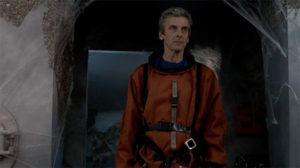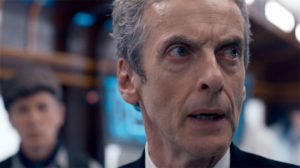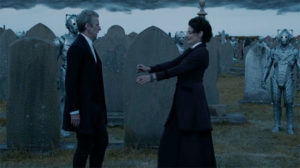Is Twelve Really So Different to Previous Doctors?
Guest contributor Robert Colonna analyses the 12th Doctor’s development over Series 8.

When the 12th Doctor hit the screens back in August 2014, no one was quite sure what exactly to expect. All that was known was that he was said to be very different than his predecessor, Matt Smith; a description that could not be more on point. But from his rudeness, to his offering of jelly babies in Mummy on the Orient Express, the 12th Doctor also harkened back to the earlier doctors like William Hartnell, Jon Pertwee, and to an extent Tom Baker.
From the start Twelve wasn’t sure who he was when he pondered, “Am I a good man?” This was a question that would define Capaldi’s Doctor’s development throughout Series 8. Throughout his first episode the 12th Doctor was shown to be cold, rude, and against hugs. This was in start contrast to his previous regeneration.
 In his second episode, Into the Dalek, he was shown as calculating and manipulative. For me one of the biggest surprises in the episode was Ross’s death. Based off the actions of the previous two Doctors, I, like most people, expected the Doctor to save Ross when he handed him that pill. Instead, knowing he couldn’t save Ross he gave him that pill to be able to track Ross’s remains. Not only was this moment shocking, but his reaction showed how different this Doctor was to previous Doctors; he barely bats an eye at Ross’s death and uses it to his advantage. His chess master attitude is similar to that of the 7th Doctor. At the end of the episode the Dalek, Rusty, says that the Doctor would make a good Dalek, thus continuing the theme of questioning if the Doctor a good man or not.
In his second episode, Into the Dalek, he was shown as calculating and manipulative. For me one of the biggest surprises in the episode was Ross’s death. Based off the actions of the previous two Doctors, I, like most people, expected the Doctor to save Ross when he handed him that pill. Instead, knowing he couldn’t save Ross he gave him that pill to be able to track Ross’s remains. Not only was this moment shocking, but his reaction showed how different this Doctor was to previous Doctors; he barely bats an eye at Ross’s death and uses it to his advantage. His chess master attitude is similar to that of the 7th Doctor. At the end of the episode the Dalek, Rusty, says that the Doctor would make a good Dalek, thus continuing the theme of questioning if the Doctor a good man or not.
 In the following episode, Robot of Sherwood, the Doctor met Robin Hood. He very much mirrors that of Robin Hood, and at the end Robin Hood himself admits that. He states that he himself is not a hero, and whether or not the Doctor is a hero, he inspires many others to be heroes. When the Doctor first set off he had no intentions of being a hero. He was travelling around in a stolen TARDIS, and it took his companions at the time, Ian and Barbara, to make him intervene in more heroic ways. While the Doctor may not see himself as a hero, his actions have saved many lives and made him a hero for many, including his current companion Clara.
In the following episode, Robot of Sherwood, the Doctor met Robin Hood. He very much mirrors that of Robin Hood, and at the end Robin Hood himself admits that. He states that he himself is not a hero, and whether or not the Doctor is a hero, he inspires many others to be heroes. When the Doctor first set off he had no intentions of being a hero. He was travelling around in a stolen TARDIS, and it took his companions at the time, Ian and Barbara, to make him intervene in more heroic ways. While the Doctor may not see himself as a hero, his actions have saved many lives and made him a hero for many, including his current companion Clara.
 In both the episodes Time Heist and Kill the Moon the Doctor’s manipulative side is developed further. Time Heist is entirely based around this, as he plays chess master in the heist itself. He convinces all of the members of the team he put together to touch a memory worm and then instructs them on how to go about the heist. He even wipes his own mind to make sure the heist goes as planned. It should be noted though that his reward at the end of the episode is being able to save the race of the Teller. This shows that the hero that was seen strongly in the character of the 10th and 11th Doctors is still there.
In both the episodes Time Heist and Kill the Moon the Doctor’s manipulative side is developed further. Time Heist is entirely based around this, as he plays chess master in the heist itself. He convinces all of the members of the team he put together to touch a memory worm and then instructs them on how to go about the heist. He even wipes his own mind to make sure the heist goes as planned. It should be noted though that his reward at the end of the episode is being able to save the race of the Teller. This shows that the hero that was seen strongly in the character of the 10th and 11th Doctors is still there.
 In Kill the Moon the Doctor’s manipulation is shown more clearly though as he upright leaves Clara, Courtney, and Lundvik on the doomed moon to make a decision on whether or not to kill the creature inside. He knows they will decide what is right, but leaves without a word causing them to figure out everything for themselves. His actions were manipulative and the Doctor did not see anything wrong with what he did. This was a very controversial moment in the series, and it even led to Clara almost leaving the Doctor for good.
In Kill the Moon the Doctor’s manipulation is shown more clearly though as he upright leaves Clara, Courtney, and Lundvik on the doomed moon to make a decision on whether or not to kill the creature inside. He knows they will decide what is right, but leaves without a word causing them to figure out everything for themselves. His actions were manipulative and the Doctor did not see anything wrong with what he did. This was a very controversial moment in the series, and it even led to Clara almost leaving the Doctor for good.
 The following episode, Mummy on the Orient Express, is full of many deaths and even more manipulation. The Doctor uses the deaths of his fellow passengers to figure out a way to defeat the Mummy so less people can die. He is cold towards their deaths and looks at them only as a way to save more lives. He manipulates Clara yet again when he has her convince Maisie to enter the laboratory and makes everyone think he is leading her to her death in able to study the Mummy further. Like the 7th Doctor in Remembrance of the Daleks, the Doctor does not reveal his plan until the last minute and switches places with Maisie in able to defeat the Mummy. The Doctor reveals at the end of the episode that sometimes all the decisions to be made are bad ones, and he has to make an impossible choice. That is what happened with all of the deaths in the episode; they were going to die, but the Doctor could use them to save others. It is inferred that he isn’t cold because he doesn’t care, but because he can’t allow himself to care.
The following episode, Mummy on the Orient Express, is full of many deaths and even more manipulation. The Doctor uses the deaths of his fellow passengers to figure out a way to defeat the Mummy so less people can die. He is cold towards their deaths and looks at them only as a way to save more lives. He manipulates Clara yet again when he has her convince Maisie to enter the laboratory and makes everyone think he is leading her to her death in able to study the Mummy further. Like the 7th Doctor in Remembrance of the Daleks, the Doctor does not reveal his plan until the last minute and switches places with Maisie in able to defeat the Mummy. The Doctor reveals at the end of the episode that sometimes all the decisions to be made are bad ones, and he has to make an impossible choice. That is what happened with all of the deaths in the episode; they were going to die, but the Doctor could use them to save others. It is inferred that he isn’t cold because he doesn’t care, but because he can’t allow himself to care.
 The “good man” arc is concluded in the finale of the series. The Doctor is given an army of Cybermen that he can use to save the universe, and it is in that moment that he realizes who is truly is. He says that he is not a good man nor a bad man, not a hero, nor a president, nor an officer. He is an idiot with a box and a screwdriver, passing through, helping out, and learning. This truly embodies what the Doctor is and has been since he first left Gallifrey. He just travels through experiencing the universe, and helping out wherever he can.
The “good man” arc is concluded in the finale of the series. The Doctor is given an army of Cybermen that he can use to save the universe, and it is in that moment that he realizes who is truly is. He says that he is not a good man nor a bad man, not a hero, nor a president, nor an officer. He is an idiot with a box and a screwdriver, passing through, helping out, and learning. This truly embodies what the Doctor is and has been since he first left Gallifrey. He just travels through experiencing the universe, and helping out wherever he can.
Overall, the 12th Doctor is different to his previous incarnations, but he also has a lot in common. While he is more manipulative than his immediate predecessors, he is very similar to the 7th Doctor in that regard. His coldness is also similar to the 1st Doctor, and in some ways to the 3rd Doctor. His love of travelling isn’t different from the 4th and 10th Doctors, and he embodies the rage and darkness seen in glimpses during the 10th and 11th Doctor’s tenures. This Doctor is cold because he has to be. Still, he is the man that he always has been. I look forward to see how he will develop further in the seasons to come, and hope to see him for many more.








